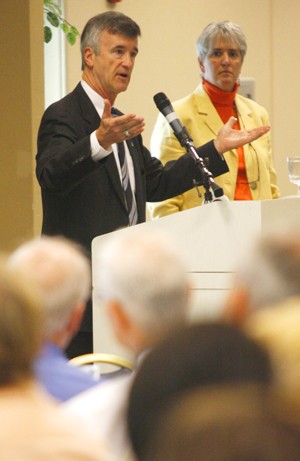Preventing the departure of leading faculty members in the light of the major university restructuring effort announced last week was at the top of the list of concerns presented by some of the more than 100 department heads and program directors who packed the Catalina Room of the Student Union Memorial Center Wednesday morning.
The town hall style meeting, led by President Robert Shelton and Provost Meredith Hay, was focused entirely on the Arizona Transformation process initiated last Friday by Shelton. The plan calls for members of the university community to prepare “”white papers”” on means of restructuring the university’s operations.
These white papers were a common refrain throughout the responses given by Shelton and Hay throughout the meeting. Proposed changes are to come from groups of faculty and staff from all departments across campus, who have been encouraged to come together and offer suggestions and ideas for improvements to the university in white papers, to be considered by the committees guiding the reorganization process.
Since its announcement, the plan has stirred up the campus, occupying the bulk of Tuesday’s Faculty Senate meeting and even causing an abortive one-day long departmental cut in the Eller College of Management on Tuesday.
Despite the tumoil, the crowd in attendance Wednesday morning was not openly hostile.
“”I thought the turnout was excellent, and the questions were direct,”” Shelton said following the meeting. “”I realize that on our campus, there will be concerns about anything affecting the university on this scale, and we don’t want to lose that.””
“”Everything is on the table,”” Hay said. “”Any proposal that follows the guidelines and includes staff, faculty and students, including teams across colleges, will be considered.””
Shelton emphasized that his reorganization is not driven by external factors, but rather his desire to improve the UA.
“”This is not about external funding,”” Shelton said. “”This is about excellence in scholarship – how we can focus ourselves on world class scholarship and incentivize teaching.””
One concern voiced by several faculty members was the difficulty of retaining faculty in the face of campuswide uncertainty.
Mike Hammond, the head of the linguistics department, worried that faculty who had the ability to do so would look to move to another institution.
“”As an administrator, you know the state of the budget, but you also try to keep your people blissfully happy,”” Hammond said following the meeting. “”In this situation, there’s no way to protect them from the possibilies – the students they see each day could be gone, their colleagues could be gone, the Xerox machine could be turned off. The reason that they came here may no longer be here.””
Despite the messiness of the process and his own misgivings, Hammond was still cautiously supportive of the reorganization process so far.
“”The truth can be painful, the truth can be scary, bur this is a risk we have to deal with proactively,”” Hammond said. “”This is the right way to go – I just wish we didn’t have to do it.””
Gail Burd, vice provost for academic affairs, said that the white papers called for by Shelton and Hay will be due to the Strategic Planning and Budget Advisory Committee by Oct. 13, after which the committee plans to review the plans and return them to individual departments for further development within two weeks.
“”This will give the departments until the end of November and first part of December to turn those (white papers) into more formal proposals,”” Hurd said.
Formal proposals could then be submitted to the Faculty Senate, where reorganization guidelines first developed by the senate in 2002 would be applied to each. Guidelines stipulate, among other things, that 75 percent of the faculty in all departments affected by the proposal approve of the proposal. If that threshold is not reached, then the Faculty Senate must appoint a separate committee to complete a 45-day review of the proposal, which would then be acted on by the Faculty Senate.
Despite the obvious hurdles, Burd remains optimistic.
“”It’s never going to happen for all of them, obviously, but I would hope that many could be in place for the new fiscal year,”” Burd said.









